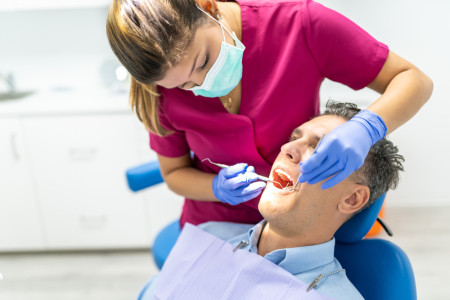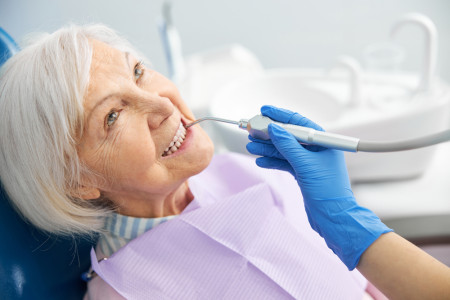Help in Finding a Milwaukee 24-Hour Emergency Dentist
Common Dental Emergencies in Milwaukee, WI
Most dental emergencies are usually characterized by severe oral pain, teeth damage, and gum infection. These emergencies can, however, take many other different forms and present a variety of symptoms. If your dental problem is disrupting your comfort and keeping you from performing your daily chores, then you need to make an emergency dental care visit. Here are some common dental emergencies in Milwaukee.

Severe Tooth Pain and Gum Bleeding
These two dental concerns occur more frequently in Milwaukee. They arise because of a variety of causes, including wobbly teeth, oral injuries, cracked teeth, and infected teeth. Washing your mouth with warm water may help your gum muscles relax, control bleeding, and ease the pain. If your gums have swollen, apply a cold compress to the outside of the mouth to minimize the swelling.
Knocked-Out Tooth
Your tooth can get knocked out from its socket after a slip and fall or an accident (sports, bicycle, or vehicle). The pain stemming from such an emergency can be awful. On the brighter side, you can have it re-implanted. You must act quickly and decisively for the re-implantation to be successful.
A knocked-out tooth can survive if it’s re-implanted within 30 minutes to an hour. Grab the tooth by the crown, ensuring you are not touching the roots. Rinse it with lukewarm water as gently as possible. Try to place it back to its socket and gently press it down with other teeth to hold it firmly in position. If you can’t, preserve it in a plastic bag of milk.
You can use the salt-water solution if you don’t have milk. While taking these measures, call an emergency dentist to make an emergency appointment. Our referral experts can set up this appointment for you, so you can concentrate on preserving your tooth. Just call us at 888-771-4655 and request help. Bring along the preserved tooth to your emergency appointment.
Cracked Tooth
A cracked tooth becomes a true dental emergency when it leads to excessive gum bleeding and excruciating dental pain. High-risk recreational activities, contact sports, road accidents, and slipping on slippery surfaces are the common causes of cracked teeth. This dental concern requires prompt emergency dental care to protect your gum tissue and nerves from further damage. A cold compress can be effective in getting the swelling under control.
Soft Tissue Injuries
Gum injuries can arise from brushing with a hard-bristled brush or when you suffer a trauma to the mouth. Injuries to the lips and tongue can arise from bites and accidents. Minor cuts to the lips, tongue, or gum do not qualify as true dental emergencies. But if the cuts are large enough, you should seek urgent dental care.
Other dental emergencies include abscess, extreme sensitivity, fractured or lost teeth, and broken dental crowns.
When are Emergency Tooth Extractions Necessary?
The primary goal of your emergency dentistry specialist is to help you keep your natural teeth. However, extracting a damaged or infected tooth is sometimes the best solution. The following are situations that necessitate emergency tooth extractions:
- Extensively decayed and permanently damaged teeth
- Infected, painful, or impacted teeth
- A severe periodontal disease
The extraction procedure can be either simple or surgical. A simple extraction involves gently moving the tooth back and forth with specific dental instruments until it disengages from its socket. A simple extraction is ideal for a tooth that has erupted fully or partially.
A surgical extraction is more invasive compared to a simple extraction. Dentists use a surgical procedure to remove impacted teeth – those that have not broken through the gum. A surgical extraction involves making a small cut on a specific gum tissue section to uncover the impacted tooth and bone. Your dentist may need to remove some bone tissue to see and access the tooth properly. Next, the dentist will cut it into pieces to ease the removal process.

When are Root Canals Essential?
A root canal refers to any dental procedure carried out to treat damage that has extended to the tooth’s inner layer. Each tooth has three lawyers: the extremely hard outer layer (enamel), the supportive yellow-colored middle layer (dentin), and the softer center layer (pulp). The pulp contains blood vessels and nerves. When decay or damage extends beyond the first two-layer and eventually to the pulp, root canal therapy will be necessary. Emergency dentists usually perform root canals on patients who experience a blend of the following symptoms:
- Excruciating toothache
- Darkening of enamel
- An advanced gum infection next to a specific tooth
- Persistent sensitivity to temperature fluctuations
Fever
Before starting the procedure, your dentist will use an anesthetic to numb the area surrounding the affected tooth. If you have a dental phobia or extremely sensitive teeth or gums, your dentist may recommend dental sedation.
Once you are fully comfortable, the dental professional creates a tiny access hole in the middle of the tooth. He or she then takes out the damaged pulp and inner tissue using files. The dentist then uses a biocompatible substance known as gutta-percha to refill the access hole.
A dentist may sometimes use a composite resin filling to refill the access hole in this case. The dentist will need to cover the treated tooth with a dental crown to protect it from cavities. A dental crown also helps restore the treated tooth’s shape and performance.
Why Should You go to an Emergency Dental Care Clinic Rather than an Emergency Room?
Medical practitioners in emergency rooms have the expertise to handle medical emergencies. They are, however, not conversant with dental care. They can provide a temporary solution when you are experiencing pain, but they cannot address the actual source of the problem. For these reasons, visiting an emergency dental office is always the best decision. Dentists have the skills, technology, and tools to handle all dental emergencies.
Contact us at 888-771-4655 whenever you experience a dental emergency in Milwaukee, WI. We will answer your call in a matter of seconds and provide you with a list of emergency dentists near you. Our dental referral service extends beyond emergencies. We can help you get cosmetic dentistry services if you want to improve your beautiful smile.
Team Emergency Dental
735 N Water St, #915 Milwaukee, WI 53202
